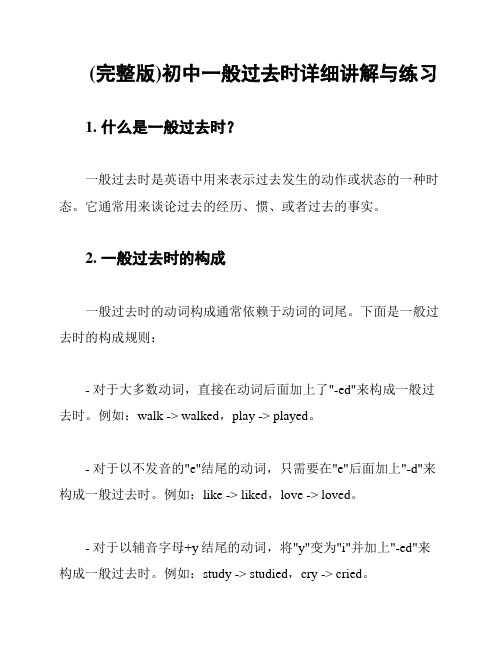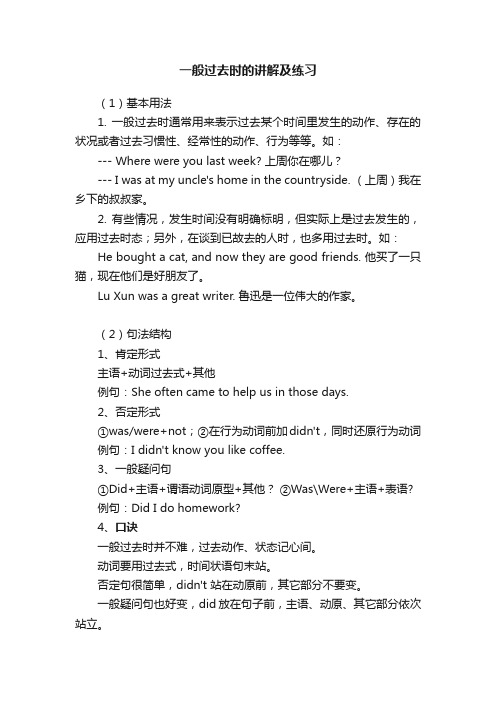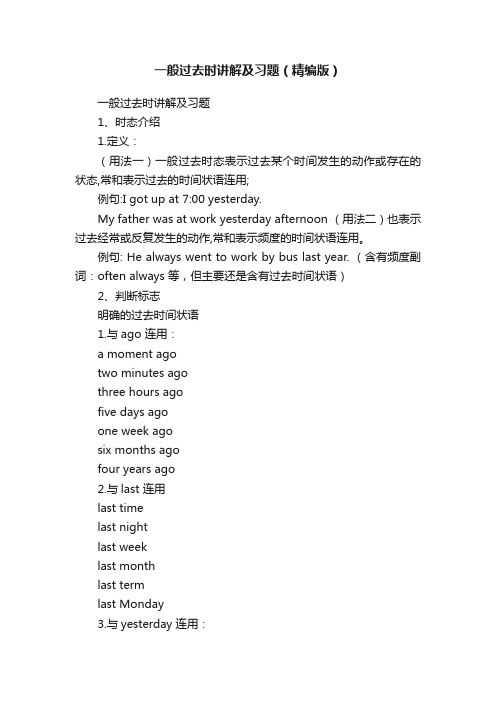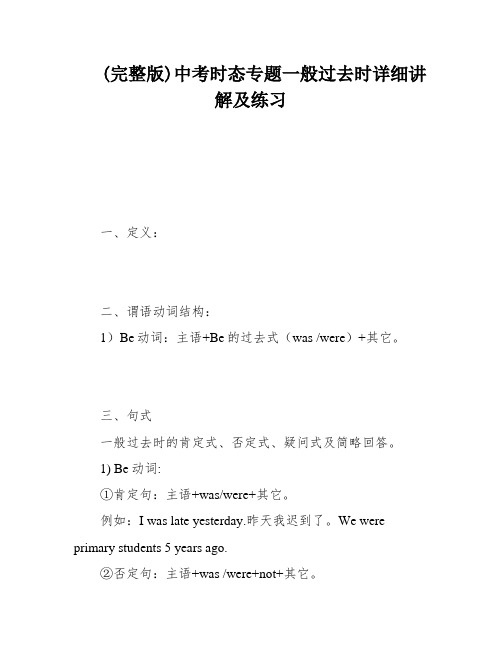初中英语语法专项突破之英语一般过去时讲解与练习
2023年初中英语语法一般过去时讲解及练习

一般过去时表示过去一些时间发生的动作或存在的状态,也可表示过去经常或反复发生的动作。
常和yesterday, ago, last week等表示过去的时间状语连用。
一、概念表示在的过去一些时间里所发生的动作或存在的状态。
通常在句子里找到表示过去时间的词或词组。
如:yesterday,yesterday morning,yesterday afternoon,yesterday evening,the day beforeyesterday(前天),last night,last week,last month,last year,a momentago(刚才),just now(刚才),two days ago,a week ago,in 1990等。
如:I went to bed ateleven last night.昨晚我11:00睡觉。
二、动词过去式的构成规律(一)规则动词的过去式1.一般情况下,在动词原形后面加-ed;如:look→lookedplay→played;2.以不发音e结尾的动词,在词尾直接加-d;如:live→liveduse→used;3.以“辅音字母+ y”结尾的动词,先将y改为i ,再加–ed;如:study→studied, try→tried fly→flied4.以重读闭音节(即辅音+元音+辅音)或r音节结尾,末尾只有一个辅音字母的动词,要先双写这个辅音字母后,再加–ed。
如:stop→stoppedplan→planned;(二)不规则动词的过去式1.改变动词中的元音;2.变词尾的–d为–t ; build→built lend→lent send→sent spend→spent bend→bent3.与动词原形一样; cut→cut put→put cost→cost hurt→hurt shut→shut4.变-ay为-aid (少数动词); say→said pay→paid lay→laid5.采用不同词根;sell→sold teach→taught buy→bought6.其他。
(完整版)初中一般过去时详细讲解与练习

(完整版)初中一般过去时详细讲解与练习1. 什么是一般过去时?一般过去时是英语中用来表示过去发生的动作或状态的一种时态。
它通常用来谈论过去的经历、惯、或者过去的事实。
2. 一般过去时的构成一般过去时的动词构成通常依赖于动词的词尾。
下面是一般过去时的构成规则:- 对于大多数动词,直接在动词后面加上了"-ed"来构成一般过去时。
例如:walk -> walked,play -> played。
- 对于以不发音的"e"结尾的动词,只需要在"e"后面加上"-d"来构成一般过去时。
例如:like -> liked,love -> loved。
- 对于以辅音字母+y结尾的动词,将"y"变为"i"并加上"-ed"来构成一般过去时。
例如:study -> studied,cry -> cried。
- 部分动词的一般过去时需要进行不规则变化。
例如:go -> went,eat -> ate。
3. 一般过去时的用法一般过去时通常用来描述以下情况:- 过去发生的动作:I walked to school yesterday.- 过去的经历:He lived in London for five years.- 过去的事实:She was a teacher in the past.4. 一般过去时的句型练下面是一些练,帮助加深对一般过去时的理解和运用:1. 请用一般过去时填空:Yesterday, I ________ (watch) a movie at home.2. 完成句子:He _____ (visit) his grandparents last summer.3. 改写句子,使用一般过去时:I read a book yesterday. (改为否定句)4. 改写句子,使用一般过去时:They played basketball in the park. (改为疑问句)5. 总结一般过去时是用来表示过去发生的动作或状态的一种时态。
突破初中语法:一般过去时(附中考真题及解析)

一般过去时01一般过去时的概念一般过去时用来表示过去某一时间内发生的动作或存在的状态以及过去习惯性、反复性的动作。
谓语动词要用动词的过去式,常和表示过去的时间状语连用,如y e s t e r d a y昨天、l a s t n i g h t昨晚、l a s t w e e k上周、l a s t y e a r去年、…a g o等。
02一般过去时结构⒈Be 动词的一般过去时在没有实义动词的句子中使用be 动词am is 的过去式为was,are 的过去式为were,was 是表示单数,were 是表示复数。
肯定句式:主语+be(was,were)其它否定句式:主语+be(was,were)+not其它一般疑问句:Be(was,were)主语+其它?⒉实义动词的一般过去时态肯定句要使用动词的过去式,否定句和疑问句要使用助动词did.肯定句式:主语+动词(过去式)+其它否定句式:主语+didn't+动词(原形)+其它(did not=didn't)一般疑问句:Did+主语+动词(原形)+其它(do,does的过去时均为did)注:did 和didn't 是构成一般过去时的助动词,其特点是要在其后跟动词的原形。
03 规则动词的过去式⒈一般情况下,在动词原形后面加-ed如:looked,played,started,visited,stayed⒉以不发音e结尾的动词,在词尾直接加-d如:lived,closed,liked,loved,tasted⒊以“辅音字母+y”结尾的动词,先将y改为i再加-ed如:study→studied,try→tried,cry-→cried,copy→copied,carry-→carried⒋以重读闭音节(即辅音+元音+辅音)或r音节结尾,未尾只有一个辅音字母的动词,要先双写这个辅音字母后,再加-ed如:stop→stopped,plan→planned04不规则动词的过去式一、AAA型(原形→原形→原形)二、ABA型(原形→过去式→原形)三、ABC型1. ow →ew →own2. i→a →u3. 原形→过去式→过去式+(e)n4. 原形→过去式→原形+(e)n5. 无规律四、ABB型1. 原形→ought →ought2. 原形→aught →aught3. 变其中一个元音字母4. 原形→□t→□t5. 变其中一个辅音字母6.辅音字母和元音字母都变五、AAB型六、有两种形式七、情态动词05 一般过去时的用法⒈表示过去某个特定时间发生的动作或存在的状态常有明确的时间状语,如yesterday,last night,some years ago,in 1890 等,以及由when 等引导的时间状语从句。
初中英语语法一般过去时专项讲解及练习

初中英语语法一般过去时专项讲解及练习一般过去时是英语中常用的时态之一,用来表示发生在过去某个具体时间的动作或状态。
以下是一般过去时的用法及一些练题。
一般过去时的用法1. 表示过去某个具体时间发生的动作或状态。
- I played football yesterday.(我昨天踢了足球。
)- She was a teacher two years ago.(两年前她是一名老师。
)2. 表示过去经常性、惯性的动作或状态。
- We always went swimming in the summer.(我们夏天经常去游泳。
)- He used to live in the countryside.(他过去住在乡下。
)3. 表示过去的客观事实或真理。
- The sun rose in the east.(太阳从东方升起。
)- She knew the answer.(她知道答案。
)一般过去时练题请根据句子的意思,在括号中填上适当的动词的过去式。
1. My friend __________ (visit) me last week.(我朋友上个星期来看我。
)2. They __________ (watch) a movie yesterday evening.(他们昨晚看了一部电影。
)3. Helen and I __________ (play) tennis together when we were children.(海伦和我小时候一起打网球。
)4. He __________ (not go) to school yesterday because he was sick.(他昨天因为生病没去上学。
)5. We __________ (live) in that house for five years before we moved.(我们在那个房子住了五年才搬走。
)总结一般过去时用于表示过去某个具体时间发生的动作或状态,过去的经常性、习惯性动作或状态,以及客观事实或真理。
(完整版)中学一般过去时详细讲解与练习

(完整版)中学一般过去时详细讲解与练习一般过去时的使用一般过去时是英语中表示过去发生的动作、状态或惯的一种时态。
在一般过去时中,动词的过去式形式通常用来表示过去的时间。
以下是一般过去时的使用情况:1. 表示过去发生的动作一般过去时可以用来表示过去已经完成的动作。
例如:- He played soccer yesterday.(他昨天踢足球。
)- She went to the beach last weekend.(她上周末去了海滩。
)2. 表示过去的状态或特征一般过去时也可以用来描述过去的状态或特征。
例如:- They were happy when they received the news.(当他们收到那个消息时他们很开心。
)- The house was big and beautiful.(那个房子又大又漂亮。
)3. 表示过去的惯一般过去时还可以用来表示过去经常性的动作或惯。
例如:- I always ate breakfast before going to school.(我过去上学前总是吃早餐。
)- She often went for a run in the evening.(她过去经常在晚上去跑步。
)一般过去时的构成与规则动词变化- 对于大多数动词,一般过去时的构成是在动词原形后面加上-ed。
例如:play → played, work → worked。
- 对于以e结尾的动词,只需要加-d。
例如:live → lived。
- 对于以辅音字母+y结尾的动词,将y变为i然后加-ed。
例如:study → studied。
- 对于以辅音字母结尾的重读闭音节动词,重读闭音节的辅音字母要双写,再加-ed。
例如:stop → stopped。
- 一些动词的过去式形式是不规则的,需要特殊记忆。
例如:go → went, eat → ate。
一般过去时的练以下是一些练,帮助你巩固一般过去时的使用和动词形式变化:1. Fill in the blanks with the correct past tense form of the verbs:- She __________ (watch) a movie last night.- They __________ (visit) their grandparents on the weekend.- He __________ (study) math for two hours yesterday.2. Rewrite the sentences in the past tense:- I go to school every day. (改为过去时)- Jane plays tennis on Saturdays. (改为过去时)- We eat pizza for lunch. (改为过去时)- She __________ (go/went) to the party last night.- We __________ (see/saw) a movie at the cinema.- He __________ (run/ran) in the race and won.请根据上述讲解和练习进行学习和练习,巩固中学一般过去时的用法和动词形式变化。
初中英语语法专项突破之英语一般过去时讲解与练习学习的啊学习的武器学习的武器

学英语简单吗?肯定会有许多学生说:“难死了”。
为什么有好多学生对英语的学习都感到头疼呢?答案只有一个:“不得法。
” 英语与汉语一样都是一种语言,为什么你说汉语会如此流利?那是因为你置身于一个汉语环境中,如果你在伦敦呆上半年,保准说起英语来会非常流利。
但很多中学生没有很好的英语环境,那么你可以自己设置一个英语环境,坚持“多说”、“多听”、“多读”、“多写”,那么你的英语成绩肯定会很出色。
一、多“说”。
自己多创造机会与英语教师多讲英语,见了同学,尤其是和好朋友在一起时尽量用英语去问候,谈心情……这时候你需随身携带一个英汉互译小词典,遇到生词时查一下这些生词,也不用刻意去记,用的多了,这个单词自然而然就会记住。
千万别把学英语当成负担,始终把它当成一件有趣的事情去做。
或许你有机会碰上外国人,你应大胆地上去跟他打招呼,和他谈天气、谈风景、谈学校……只是别问及他的年纪,婚史等私人问题。
尽量用一些你学过的词汇,句子去和他谈天说地。
不久你会发现与老外聊天要比你与中国人谈英语容易的多。
因为他和你交谈时会用许多简单词汇,而且不太看重说法,你只要发音准确,准能顺利地交流下去。
只是你必须要有信心,敢于表达自己的思想。
如果没有合适的伙伴也没关系,你可以拿过一本书或其它什么东西做假想对象,对它谈你一天的所见所闻,谈你的快乐,你的悲伤等等,长此坚持下去你的口语肯定会有较大的提高。
二、多“听”寻找一切可以听英语的机会。
别人用英语交谈时,你应该大胆地去参与,多听听各种各样人的发音,男女老少,节奏快的慢的你都应该接触到,如果这样的机会少的话,你可以选择你不知内容的文章去听,这将会对你帮助很大,而你去听学过的课文的磁带,那将会对你的语言语调的学习有很大的帮助。
三、多“读”。
“读”可以分为两种。
一种是“默读”。
每天给予一定时间的练习将会对你提高阅读速度有很大的好处,读的内容可以是你的课本,但最好是一些有趣的小读物,因为现在的英语高考越来越重视阅读量和阅读速度。
初中英语语法专项突破之英语一般过去时讲解与练习

初中英语一般过去时知识讲解与训练第一部分:知识讲解1.一般过去时表示过去某个时间发生的动作或存在的状态,常和表示过去的时间状语连用。
一般过去时也表示过去经常或反复发生的动作。
2.Be动词在一般过去时中的变化:⑴am和is在一般过去时中变为was。
(was not=wasn’t)⑵are在一般过去时中变为were。
(were not=weren’t)⑶带有was或were的句子,其否定、疑问的变化和is, am, are一样,即否定句在was或were后加not,一般疑问句把was或were放到句首。
3.句中没有be动词的一般过去时的句子否定句:didn’t +动词原形,如:Jim didn’t go home yesterday.一般疑问句:在句首加did,句子中的动词过去式变回原形。
如:Did Jim go home yesterday?特殊疑问句:⑴疑问词+did+主语+动词原形?如:What did Jim do yesterday?⑵疑问词当主语时:疑问词+动词过去式?如:Who went to home yesterday?动词过去式变化规则:1.一般在动词末尾加-ed,如:pull-pulled, cook-cooked2.结尾是e加d,如:taste-tasted3.末尾只有一个元音字母和一个辅音字母的重读闭音节,应双写末尾的辅音字母,再加-ed,如:stop-stopped4.以“辅音字母+y”结尾的,变y为i,再加-ed,如:study-studied5.不规则动词过去式:am,is-wasare-were,do-did,see-saw, say-saidgive-gave,get- got, go-went,come-came, have-had,eat-ate,take-took,run-ran,sing-sang,put-put,make-made, read-read,write-wrote, draw-drew,drink-drank,fly-flew, ride-rode, speak-spoke,sweep-swept, buy-boughtswim-swam, sit-sat bring--broughtcan-could cut-cutbecome-becamebegin-begandraw-drewfeel-felt find-foundforget-forgot hear-heard keep-keptknow-knewlearn-learnt(learned)leave-left let-let lose-lostmeet-met read-read sleep-sleptspeak-spoke take-tookteach-taught tell-told write-wrotewake-wokethink-though常见错误如下:一把动词变成过去式易出错例: 1 They stoped (stop) talking just now.2 They plaied (play) football yesterday.答案: 1 stopped 2 played解析:我们可以记住下面的口诀:"动词变成过去式,双写规律要牢记;y前若是辅音字,y变i加-ed;y前若是元音字,只须直接加-ed."二忘记把动词变成过去式例: I fly (fly) kites on the afternoon of Sunday.答案: flew解析:我们可以记住下面的口诀:"一般过去时态里,过去形式莫忘记".自主检测:(一)选择1 She lived there before he____to China.A. cameB. comesC. comeD. coming2 I _____but_____nothing.A . was listened;was hearing B. listened;heardC . have listened; heard D. listened; heard of3 When did you ____here?A. got toB. reachedC. arrive inD. reach4 I____my homework at 7:00 yesterday evening.A. finishedB. would finishC. was finishingD. finish5 -He didn't go shopping with you yesterday afternoon, did he?- _______.A. No, he doesn'tB. Yes, he didn'tC. No, he didD. Yes, he did.6 -I have had supper.- When ____you____it?A. have; hadB. do, haveC. did,haveD. will have答案: 1 A 2 B 3 D 4 A 5 D 6 C(二)填空1 They____(be) on the farm a moment ago.2 There____(be)a shop not long ago.3 Jenny____(not go)to bed until 11:00 o'clock last night.4 Danny _____(read )English five minutes ago.5 I _____(see)Li Lei ____(go) out just now.6 He ____(do)his homework every day. But he __(not do)it yesterday.7 When I was young, I _____(play)games with my friends.8 When ____you_____(write)this book?I _____it last year.9 Did he____(have) lunch at home?10 I _____(eat) the bread, I 'm full now.答案:1 were 2 was 3 didn't go 4 read 5 saw go6 does ; didn't do7 played8 did write ; wrote9 have 10 have eaten 三在句式变换时易出错例: 1 We didn't went (not go) out last Friday.2 Did you had (have) a good time yesterday?答案: 1 didn't go 2 Did have解析:请记住口诀"见助动,用原形."四易与单三人称作主语的一般现在时弄混例: He taughts (teach) me English last year.答案: taught解析:行为动词的过去式无人称和数的变化.即使主语是单三人称,也和其它人称所用动词的形式一样.第二部分:练习过去时练习:写出下列动词的过去式is\am_________fly_______plant________are ________drink_________play_______go________make ________ does_________dance________worry________ask _____taste_________eat__________ draw________put ______throw________ kick_________pass_______do ________一、用be动词的适当形式填空。
初中一般过去时讲解及练习答案(20210308193201)

一般过去时讲解及练习一、一般过去时的概念和用法一般过去时表示过去某个时间发生的动作或存在的状态,常和表示过去的时间状语连用。
一般过去时也表示过去经常或反复发生的动作。
Eg: -What did you do yesterday-I met Lin Tao .(过去某个时间发生的动作)I was there a moment ago.(过去某个时间存在的状态)We often pIayed together when we were chi Idren.(过去经常或反复发生的动作) 注:表示过去经常发生的动作还可用used to oEg: He used to smoke a lot, but he doesn, t now.他过去经常抽烟,但现在不抽了。
二、常用于一般过去时的时间状语yesterday, this morning, just, just now, . . . ago (a moment ago, 3 days ago, 2 hours ago. . .), in the past, last night / year / week, once upon a time, the other day,以及时间状语从句中(常用弓I导词:before, after, when, unt i I, as soon as 等)。
Eg: It was raining heav iIy when I I eft school,Mr. Green didn' t start cooking unti I his son v/as back from school Iast night.三、一般过去时对谓语动词的要求(一般过去时用动词的过去式构成。
即一般过去时的谓语动词要用动词的过去式。
动词过去式的构成分规则变化和不规则变化两种形式,不规则变化通常需要逐个记忆,规则变化则遵循以下原则:(1)一般在动词后加-ed。
一般过去时讲解及练习

一般过去时1)在确定的过去时间里所发生的动作或存在的状态。
时间状语有:yesterday, an hour ago, the other day, ,yesterday morning (afternoon, evening), last night (week, month, year…), a moment ago , a week ago, three years ago… just now,in the past等。
Where did you go just now?2)谓语动词形式为动词的过去式,一般在动词原形后加-ed,I was tired last night,昨天晚上我很累。
We visited the museum yesterday.昨天我们参观了那个博物馆。
二、一般过去时的构成1.was/were+形容词/名词/...如I was at home yesterday.昨天我在家。
Mr.Green was not a teacher last year.去年格林女士不是一个老师。
系动词be的过去式为am,is→was are→were第一人称单数(I)/第三人称单数(he/she/it)+was第二人称单数(you)/各人称复数(we/you/they)+were.2.实义动词的过去式+其他成分My mother went shopping yesterday.我妈妈昨天去购物了。
His uncle worked in Beijing in 2014.他叔叔2014年在北京工作。
三、一般过去时的句式四、动词过去式的变化规则used to + do:"过去常常"表示过去习惯性的动作或状态,但如今已不存在。
Mother used to take a walk. (过去常常散步)二、构成及变化1. Be动词在一般过去时中的变化:am 和is在一般过去时中变为was。
初中英语一般过去时讲解练习及答案

一、一般去的定一般去表示去某一候或某一段所生了的事情或存在的状。
常与去 yesterday,thismorning,justnow,amomentago,inMay,last night/year/week,onceuponatime,theotherday,beforeclause,in⋯the,when –past用。
如:Whatdidyoudoyesterday?昨天你干了什么?ImetLinTaothismorning.今日上午我会到了林涛。
Iwasthereamomentago. 才我在那边二、用法明1表示在去某个所生的作或所的状。
常与yesterday,lastweek,in1989,justnow,amomentago,theotherday等用。
如:Hewasherejustnow.他才在里。
Whatdidyoudoyesterday?你昨天做了什么事?在去一段内的常性或性作。
如:Weoftenplayedtogetherwhenwewerechildren.我小候常在一同玩。
注:表示去常生的作可用usedto如:Heusedtosmokealot,buthedoesn和would。
’他tnow去.常吸烟,但在不抽了。
Wheneverwewereintrouble,hewouldhelpus.每当我碰到困,他都会帮助我。
表示主去的特点或性格。
如:AtthattimeshewasverygoodatEnglish.那她英学得很好。
用在状从句中表示去未来。
如:Hesaidhewouldwaituntiltheycameback.5一般去有能够表示在,多与want,hope,wonder,think,intend等用,负气更委宛。
如:Iwonderedifyoucouldhelpme.不知你能不可以帮我一下。
实用一般去也是一致的需要。
如:Ididn’tknowyouwerehere没.想到你在里。
2019年中考英语语法专题讲练: 一般过去时 讲解附练习(含解析)

一般过去时一般过去时知识精讲一、一般过去时表示过去某个时间里发生的动作或状态;过去习惯性、经常性的动作、行为;过去主语所具备的能力和性格。
二、句子结构主语+did (动词过去式)主语+was/were三、基本用法四、时间状语:1. yesterday, the day before yesterday2. 时间段+ago: three years ago, long ago…3. last: last day/ week/ year…4. in +过去年份: in 2015…5. just now 刚才五、一般过去时动词过去式的规则变化六、一般过去时动词过去式的不规则变化七、相关句式三点剖析一、考点:一般过去的基本用法以及动词过去式的变化规则和不规则变化。
二、易错点:be(is\am\are) 动词本身就是独立的谓语动词,不能与行为动词的过去式同时使用。
不少学生经常出这样的错误。
例:It was rained yesterday. (错误)It rained yesterday. (正确)过去式动词不存在第三人称单数的问题。
也就是说,一般过去时的句子中,无论主语是什么人称,单数还是复数,统一为动词的过去式。
三、补充点在时间状语从句和条件状语从句中,用一般过去时表示过去将来的动作。
例:He said he would come if I promised to wait for him.他说如果我答应等他,他会来的。
题模精选题模一:动词的过去式变化规则例1.1.1写出下列动词的过去式形式。
1.am/is _________ do _________ go _________ have_________2. isn’t _________ aren’t _________ spend_________ cook_________3. read _________ clean _________ live _________ study_________题模二:基本用法例1.2.1My father_________ ill yesterday.A.isn’t B.aren’tC.wasn’t D.weren’t例1.2.2Did you_________ to the national library last week?A.go B.went C.goes D.goed例1.2.3--- _________ he _________ his lunch last night?--- Yes, he did.A.Does; has B.Did; haveC.Did; has D.Does; had题模三:句型转换例1.3.1Lucy did her homework at home.(改为否定句)____________________________________________例1.3.2I read an interesting book about history last night. (改为否定句)____________________________________________例1.3.3He found some meat in the fridge.(变一般疑问句)____________________________________________例1.3.4She saw Li Lei just now. (变一般疑问句,并作否定回答)____________________________________________随堂练习随练1.1写出下列动词的过去式形式1. go _________ enjoy _________2. buy _________ eat _________3. get _________ walk _________4. take _________ dance _________5. write _________ run _________6. swim _________ find _________7. begin _________ are _________8. play _________ study _________随练1.2用动词的适当形式填空。
一般过去时的讲解及练习

一般过去时的讲解及练习(1)基本用法1. 一般过去时通常用来表示过去某个时间里发生的动作、存在的状况或者过去习惯性、经常性的动作、行为等等。
如:--- Where were you last week? 上周你在哪儿?--- I was at my uncle's home in the countryside. (上周)我在乡下的叔叔家。
2. 有些情况,发生时间没有明确标明,但实际上是过去发生的,应用过去时态;另外,在谈到已故去的人时,也多用过去时。
如:He bought a cat, and now they are good friends. 他买了一只猫,现在他们是好朋友了。
Lu Xun was a great writer. 鲁迅是一位伟大的作家。
(2)句法结构1、肯定形式主语+动词过去式+其他例句:She often came to help us in those days.2、否定形式①was/were+not;②在行为动词前加didn't,同时还原行为动词例句:I didn't know you like coffee.3、一般疑问句①Did+主语+谓语动词原型+其他?②Was\Were+主语+表语?例句:Did I do homework?4、口诀一般过去时并不难,过去动作、状态记心间。
动词要用过去式,时间状语句末站。
否定句很简单,didn't 站在动原前,其它部分不要变。
一般疑问句也好变,did放在句子前,主语、动原、其它部分依次站立。
特殊疑问句也简单,疑问词加一般疑问句记心间。
最后一条请注意,动词过去式要牢记!(3)时间状语与一般过去时连用的时间状语有:yesterday(昨天), last night (昨晚), last week(上个星期), four days ago(四天前), in 2002(在2002年), just now(刚才), the day before yesterday(前天)等。
一般过去时讲解及习题(精编版)

一般过去时讲解及习题(精编版)一般过去时讲解及习题1、时态介绍1.定义:(用法一)一般过去时态表示过去某个时间发生的动作或存在的状态,常和表示过去的时间状语连用;例句:I got up at 7:00 yesterday.My father was at work yesterday afternoon (用法二)也表示过去经常或反复发生的动作,常和表示频度的时间状语连用。
例句: He always went to work by bus last year. (含有频度副词:often always 等,但主要还是含有过去时间状语)2、判断标志明确的过去时间状语1.与ago 连用:a moment agotwo minutes agothree hours agofive days agoone week agosix months agofour years ago2.与last 连用last timelast nightlast weeklast monthlast termlast Monday3.与yesterday 连用:yesterday morningyesterday afternoonyesterday evening the day before yesterday 4.与one 连用:one morningone eveningone dayone Monday afternoon5.与that 连用:that morningthat winterthat daythat year6.其他时间状语:just now 刚刚不久in the old days昔时,从前,过去in those days当时,那时候;当年in 1980the other day前几天at that time在那时;当时once upon a time在很久很久以前3、一般过去时构成be动词(was,were)助动词(did)主语+谓语情态动词(could,might)实义动词(有确切含义的动词,可以单独做谓语,如:played等)例如:They were happy.He played football.You did your homework.4、一般过去时句式变换1.肯定句:主语+ 动词过去式be动词过去式(was / were)e.g. We played football yesterday.I was in the office last night.He couldn’t swim 10 years ago.2.否定句:主语+ did not / didn’t + 动词原形was not / wasn’t + 其他成分we re not / weren’t + 其他成分e.g. I was not in the office last night.I didn't sing a song at Kangkang's party.I didn't play video games.3. 一般疑问句Did + 主语+动词原形?Was / were + 主语+其他成分?eg. - Did you go shopping yesterday?-Yes, I did. / No, I didn’t.-Was she 15 years old last year?4. 特殊疑问句特殊疑问词+did + 主语+行为动词原形?特殊疑问词+was / were + 主语+其他成分?eg. - Did you go shopping yesterday? When and where were you born?5、谓语变化构成规则规则动词过去式的构成1.一般在动词原形末尾加-edlook lookedplay playedstart started2.结尾是e 的动词加-dlive livedhope hopeduse used3. 末尾只有一个辅音字母的重读闭音节词(辅元辅),先双写这个辅音字母,再加-edstop stoppedplan plannedtrip tripped4. 结尾是“辅音字母+y”的动词,先变“y”为“i”再加-ed study studiedcarry carried规则动词-ed的读音说明:1、清念/t/ ,即ed 在清辅音后面念/t/ ,例:finished helpedpassed cooked2、元浊/d/ ,即ed 在元音,浊辅音后面念/d/例:borrowed enjoyedcalled moved3、/t/ /d/ 之后念/id/ , 即ed 在/t/ /d/ 音后面念/id/例:wanted shoutedneeded counted不规则动词的过去式am, is -- wasare -- weredo -- didgo -- wenthave -- hadsee -- sawcan -- couldmay -- mightdig -- dugeat -- atefind -- foundmake -- madehear -- heardrun -- ran take -- took hold -- heldspeak -- spoke leave -- leftkeep -- keptsleep -- slept sweep -- swepttell -- toldsell -- soldbegin -- begansing -- sangsit -- satswim -- swamring -- ranggive -- gavebring -- broughtbuy -- boughtthink -- thought teach -- taught catch -- caught come -- came become -- becamegrow -- grewknow -- knewthrow -- threwblow -- blewwrite -- wrotedrive -- droveride -- rodeget -- gotforget -- forgotlend -- lentsend -- sentspend -- spentsay -- said */sed/pay -- paidstand -- stoodunderstand -- understoodlet -- let put -- putcut -- cut read -- read*巧记动词一般过去时,表示过去发生事;be用was或用were, have,has变had;谓语动词过去式,过去时间坐标志;一般动词加-ed,若是特殊得硬记。
(完整版)中考时态专题一般过去时详细讲解及练习

(完整版)中考时态专题一般过去时详细讲解及练习一、定义:二、谓语动词结构:1)Be动词:主语+Be的过去式(was /were)+其它。
三、句式一般过去时的肯定式、否定式、疑问式及简略回答。
1) Be动词:①肯定句:主语+was/were+其它。
例如:I was late yesterday.昨天我迟到了。
We were primary students 5 years ago.②否定句:主语+was /were+not+其它。
例如:___(我们昨天没迟到)③一般疑问句:be动词提前。
Was/Were+主语+其它?例如:I was ___(改一般疑问句) →Were you ill yesterday?(你昨天病了吗?)肯定回答:Yes, I was. (是的,我病了。
)否定回答:No, I wasn't. (不,我没病。
)④特殊疑问句:对谓语动词进行提问的:疑问词+was/were+主语+其它(一般疑问句)?2) 实义动词:①肯定句:主语+V-ed+其它。
例如:I called up my good friend just now.②否定句:主语+didn’t+V原形+其它。
例如:I didn’t argue with Tom last week.③一般疑问句:Did+主语+V原形+其它?例如:___ 2010. (改一般疑问句) →Did you buy a souvenir in 2010?肯定回答:Yes, I did.否定回答:No, I didn’t.④特殊疑问句:疑问词+did+主语+V原形+其它?例如:When did you buy the book?(你是什么时候买的这本书?)Finally, let's fill in the blanks with the correct form of the verb. "Was" should be used for the first blank, "played" for the second, "went" for the third, and "read" for the fourth.5. Tom was upset because he had failed the English test again.6. We moved to Beijing 8 years ago.1. C2. C3. B4. A5. C6. A7. B8. ATom was ___ down because he had failed his English test once again. It had e a recurring problem for him. Eight years ago,my family and I relocated to Beijing. This morning, I asked my friend what time she had arrived at school.1. What did they have for breakfast last week?2. ___?3. Jim ___ she was ___.4. They were not late the day before yesterday.5. Where did you go?6. Did Wei Fang have a good time last summer n? Yes, she did. / No, she didn't.7. Li Hong did not do her ___.8. How did Mr Gao go to work last year?9. Is there tea in the cup?1. Did Wei Fang have a good time last summer n? Yes, she did. / No, she didn't.2. Li Hong did not do her ___.3. How did Mr Gao go to work last year?4. Is there tea in the cup?。
完整版)一般过去时讲解及练习

完整版)一般过去时讲解及练习一般过去时是用来描述在确定的过去时间里所发生的动作或存在的状态。
常见的时间状语有yesterday、an hour ago、the other day、XXX、last night/week/month/year、a moment ago、a week ago、three years ago、just now和in the past等。
例如:“Where did you go just now?”(你刚才去哪了?)。
一般过去时的谓语动词形式为动词的过去式,一般在动词原形后加-ed。
例如:“I was tired last night.”(昨天晚上我很累)和“XXX.”(昨天我们参观了那个博物馆)。
一般过去时的构成有两种方式。
第一种是用was/were+形容词/名词等。
例如:“I was XXX.”(昨天我在家)和“Mr.Green was not a teacher last year.”(去年XXX不是一个老师)。
系动词be的过去式为am/is→was、are→were。
第一人称单数(I)和第三人称单数(he/she/it)用was,第二人称单数(you)和各人称复数(we/you/they)用were。
第二种是用实义动词的过去式+其他成分。
例如:“XXX.”(我妈妈昨天去购物了)和“His uncle worked in Beijing in 2014.”(他叔叔2014年在北京工作)。
一般过去时的句式有三种。
肯定句的形式是主语+was/were+其他或主语+实义动词的过去式+其他。
例如:“XXX.”(上周日我去探望了爷爷)和“I was not at school at this time yesterda y.”(昨天的这个时候我没在学校)。
否定句的形式是主语+did+not+实义动词的原形+其他。
例如:“XXX.”(上周我什么都没买)。
疑问句的形式是Was/Were+主语+其他?例如:“Was she at home yesterday?”(昨天她在家吗?)Did you have a good time last weekend。
(完整版)初中一般过去时讲解及训练

(完整版)初中⼀般过去时讲解及训练⼀般过去时讲解及练习⼀、⼀般过去时的概念和⽤法⼀般过去时表⽰过去某个时间发⽣的动作或存在的状态,常和表⽰过去的时间状语连⽤。
⼀般过去时也表⽰过去经常或反复发⽣的动作。
Eg:-What did you do yesterday?-I met Lin Tao . (过去某个时间发⽣的动作)I was there a moment ago. (过去某个时间存在的状态)We often played together when we were children.(过去经常或反复发⽣的动作)注:表⽰过去经常发⽣的动作还可⽤used to 。
Eg:He used to smoke a lot, but he doesn’t now. 他过去经常抽烟,但现在不抽了。
⼆、常⽤于⼀般过去时的时间状语yesterday, this morning,just, just now, ...ago(a moment ago,3 days ago,2 hours ago...), in the past,last night / year / week, once upon a time, the other day,以及时间状语从句中(常⽤引导词:before,after,when,until,as soon as 等)。
Eg:It was raining heavily when I left school.Mr Green didn’t start cooking until his son was back from school last night.三、⼀般过去时对谓语动词的要求⼀般过去时⽤动词的过去式构成。
即⼀般过去时的谓语动词要⽤动词的过去式。
动词过去式的构成分规则变化和不规则变化两种形式,不规则变化通常需要逐个记忆,规则变化则遵循以下原则:(1)⼀般在动词后加-ed。
如:play—played, offer—offered, weigh—weighed, destroy— destroyed, sign—signed.(2)在以字母e结尾的动词后,只加-d。
初中英语一般过去时讲解练习及答案

初中英语⼀般过去时讲解练习及答案(⼆)⼀般过去式的句型结构1. 谓语动词为Be动词过去式句型肯定句:主语+was/were+其他否定句:主语+wasn’t/weren’t+其他⼀般疑问句:Was/Were+主语+其他?特殊疑问句:特殊疑问词+ was/were+主语+其他?2. 谓语动词为实义动词过去式的句型肯定句:主语+动词过去式+其他否定句:主语+didn’t +动词原形+其他⼀般疑问句:Did+主语+动词原形+其他?特殊疑问句:特殊疑问词+did+主语+动词原形+其他?⼀、⼀般过去时的定义⼀般过去时表⽰过去某⼀时候或某⼀段时间所发⽣了的事情或存在的状态。
常与过去时间yesterday, this morning, just now, a moment ago, in May, last night / year / week, once upon a time, the other day, before …, when – clause, in the past连⽤。
如:What did you do yesterday? 昨天你⼲了什么?I met Lin Tao this morning. 今天上午我会到了林涛。
I was there a moment ago. 刚才我在那⼉⼆、⽤法说明1表⽰在过去某个时间所发⽣的动作或所处的状态。
常与这些时间副词连⽤((1). yesterday或以其构成的短语:yesterday morning(afternoon, evening)等;(2). 由“last+⼀时间名词”构成的短语:last night, last year (winter, month, week)等;(3). 由“时间段+ago”构成的短语:a moment ago, a short time ago, an hour ago等;(4). 其它:in 1989, just now, a moment ago, the other day等如:He was here just now. 他刚才还在这⾥。
- 1、下载文档前请自行甄别文档内容的完整性,平台不提供额外的编辑、内容补充、找答案等附加服务。
- 2、"仅部分预览"的文档,不可在线预览部分如存在完整性等问题,可反馈申请退款(可完整预览的文档不适用该条件!)。
- 3、如文档侵犯您的权益,请联系客服反馈,我们会尽快为您处理(人工客服工作时间:9:00-18:30)。
1.用be doing表示将来:主要意义是表示按计划、安排即将发生的动作,常用于位置转移的动词。
如:go,come,leave,arrive等,也可用于其他动作动词。
We are having fish for dinner.We are moving to a different hotel the day after tomorrow.这种用法通常带有表示将来的时间状语,如果不带时间状语,则根据上下文可表示最近即将发生的动作。
A: Where are you going? B: I am going for a walk. Are you coming with me?A: Yes,I am just coming. Wait for me.2.用be going to do表示将来:主要意义,一是表示―意图‖,即打算在最近的将来或将来进行某事。
Are you going to post that letter?How long is he going to stay here?I am going to book a ticket.另一意义是表示―预见‖,即现在已有迹象表明将要发生或即将发生某种情况。
It’s going to rain.George is putting on weight; he is going to be quite fat.3. 用will/ shall do表示将来:一是表示预见You will feel better after taking this medicine.Do you think it will rain?二是表示意图.I will not lend the book to you.Take it easy,I will not do it any longer.基本结构:She will come to have class tomorrow.Will she come to have class tomorrow?She won’t come to have class tomorrow.What will she do tomorrow?肯定形式:①am/is/are going to + do;②will/shall + do.否定形式:①am/is/are going not to + do;②will/shall not + do.(1)表示将要发生的动作或存在的状态及打算、计划或准备做某事。
将来一般时用来表示单纯的将来事实。
将来一般时常和表将来的时间状语连用,如:tomorrow,next week,next month,next year,in a few days等。
如:He’ll come next week. 他下星期来。
(2)用于状语从句中。
表时间和条件的状语从句一般用现在一般时表将来,但有时亦可用将来一般时。
连词before引导的时间状语从句可用将来一般时。
如:It will be long before he will come back.他要过很久才会回来。
(此句重点是before从句)(3)表条件的if从句亦可用将来一般时,这种从句的主语多用it。
如:I will come tomorrow if it will suit you.如果对你方便的话,我明天来。
一般将来时练习一、用所给动词的一般将来时填空1. I ______(leave)in a minute. I ______(finish)all my work before I ______ (leave).2. —How long _____ you _____(study)in our country?—I _____(plan)to be here for about one more year.—I _____(hope)to visit the other parts of your country.—What ______ you ______(do)after you ______(leave)here?—I ______(return)home and ______(get)a job.3. I ______(be)tired. I ______(go)to bed early tonight.4. Mary’s birthday is next Monday, her mother _____(give)her a present.5. It is very cold these days. It ______(snow)soon.6. —_____ you _____(be)here this Saturday?—No. I ______(visit)my teacher.7. —______ I ______(get)you a copy of today’s newspaper?—Thank you.8. I am afraid there ______(be)a meeting this afternoon. I can’t join you.9. Mike ______(believe, not)this until he ______(see)it with his own eyes.10. Most of us don’t think their team ______(win).二、单项选择1. There __________ a meeting tomorrow afternoon.A. will be going toB. will going to beC. is going to beD. will go to be2. Charlie ________ here next month.A. isn’t workingB. doesn’t workingC. isn’t going to workingD. won’t work3. He ________ very busy this week, he ________ free next week.A. will be; isB. is; isC. will be; will beD. is; will be4. There ________ a dolphin show in the zoo tomorrow evening.A. wasB. is going to haveC. will haveD. is going to be5. –________ you ________ free tomorrow?– No. I ________ free the day after tomorrow.A. Are; going to; willB. Are; going to be; willC. Are; going to; will beD. Are; going to be; will be6. Mother ________ me a nice present on my next birthday.A. will givesB. will giveC. givesD. give7. – Shall I buy a cup of tea for you?–________. (不,不要。
)A. No, you won’tB. No, you aren’t.C. No, please don’tD. No, please.8. – Where is the morning paper?– I ________ if for you at once.A. getB. am gettingC. to getD. will get9. ________ a concert next Saturday?A. There will beB. Will there beC. There can beD. There are10. If they come, we ________ a meeting.A. haveB. will haveC. hadD. would have11. He ________ her a beautiful hat on her next birthday.A. givesB. gaveC. will givingD. is going to giving12. He ________ to us as soon as he gets there.A. writesB. has writtenC. will writeD. wrote13. He ________ in three days.A. coming backB. came backC. will come backD. is going to coming back14. If it ________ tomorrow, we’ll go roller-skating.A. isn’t rainB. won’t rainC. doesn’t rainD. doesn’t fine15. – Will his parents go to see the Terra Cotta Warriors tomorrow?– No, ________ (不去).A. they willn’tB. they won’t.C. they aren’tD. they don’t.16. Who ________ we ________ swimming with tomorrow afternoon?A. will; goB. do; goC. will; goingD. shall; go17. We ________ the work this way next time.A. doB. will doC. going to doD. will doing18. Tomorrow he ________ a kite in the open air first, and then ________ boating in the park.A. will fly; will goB. will fly; goesC. is going to fly; will goesD. flies; will go19. The day after tomorrow they ________ a volleyball match.A. will watchingB. watchesC. is watchingD. is going to watch20. There ________ a birthday party this Sunday.A. shall beB. will beC. shall going to beD. will going to be21. They ________ an English evening next Sunday.A. are havingB. are going to haveC. will havingD. is going to have22. ________ you ________ free next Sunday?A. Will; areB. Will; beC. Do; beD. Are; be23. He ________ there at ten tomorrow morning.A. willB. isC. will beD. be24. ________ your brother ________ a magazine from the library?A. Are; going to borrowB. Is; going to borrowC. Will; borrowsD. Are; going to borrows25. – Shall I come again tomorrow afternoon?–________ (好的).A. Yes, pleaseB. Yes, you will.C. No, pleaseD. No, you won’t.26. It ________ the year of the horse next year.A. is going to beB. is going toC. will beD. will is27. ________ open the window?A. Will you pleaseB. Please will youC. You pleaseD. Do you28. –Let’s go out to play football, shall we?– OK. I ________.A. will comingB. be going to comeC. comeD. am coming29. It ________ us a long time to learn English well.A. takesB. will takeC. spendsD. will spend30. The train ________ at 11.A. going to arriveB. will be arriveC. is going toD. is arriving三、把下列各句译成英语1.我叔叔今晚要来。
